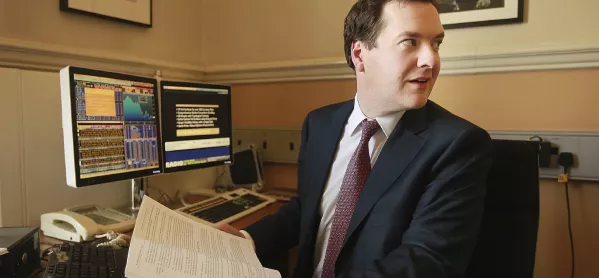- Home
- What the budget means for schools: Latest
What the budget means for schools: Latest

-
Chancellor, George Osborne, has committed an extra £0.5bn to “speed up” the introduction of a “fair” national school funding formula
-
He wants to get more than 90 per cent of the “schools that will benefit onto the new formula by the end of this parliament”.
-
The government is to focus on the performance of schools in the north, where Mr Osborne says “results have not been as strong as we’d like”.
- It will provide £20m per year for a “northern powerhouse schools strategy”. The money will be used to bring in “proven leaders” to mentor weak schools; to set up a northern branch of the New Schools Network, the charity that helps groups to set up free schools. It will also pay for “turnaround activity” in coasting schools.
-
“London’s school system has been turned around; we can do the same in the Northern Powerhouse and I’ve asked outstanding Bradford head teacher Sir Nick Weller to provide us with a plan,” Mr Osborne said.
-
He added: “We are going to look at teaching maths to 18 for all pupils.”
- All schools will become academies. Every school in England will have to either have become an academy by 2020, or to have an academy order in place by 2020 so that they will be committed to converting by 2022. The government will take on “radical” new powers over schools that fail to put an academy conversion plan in place, which will allow it to force them to do so.
- “It is simply unacceptable that Britain continues to sit too low down the global league tables for education,” according to chancellor George Osborne. “So I’m going to get on with finishing the job we started five years ago, to drive up standards and set schools free from the shackles of local bureaucracy.”
- Journalists have been briefed that provision will be made to encourage academy chains to take over “Cinderella schools” that are unattractive to potential sponsors because of their small size, tight budgets, expensive buildings or remote locations.
- But school leaders warned yesterday that full academisation would create “significant risks” for primary schools.
- And NUT deputy general secretary Kevin Courtney, said: “Parents will be as outraged as teachers that the Government can undo over 50 years of comprehensive public education at a stroke.”
- More than £1.5 billion in additional funding will be spent on education over this parliament.
-
But the money has not won school leaders over. Malcolm Trobe, interim general secretary of the Association of School and College Leaders, said: “While we welcome any additional funding for schools, the reality is that the government has already made savings by requiring schools to pay increased employer National Insurance and pension contributions from existing budgets. This is a significant real-terms cut. The ‘additional’ funding is a classic case of the large print giveth while the small print taketh away.”
-
Secondaries can open for longer. There will be £285 million funding to allow a quarter of secondary schools to rethink the “structure and duration” of their school day by opening for longer hours, ending what Mr Osborne calls the “Victorian tradition” of finishing at 3.30pm. Schools that successfully bid for the funding can use it to provide at least five extra hours a week for extra-curricular activities such as art and sport.
-
A report by the Education Endowment Foundation has found that, on average, pupils make two additional months’ progress per year from extended school time, or the targeted use of before and after school programmes. It found some evidence that disadvantaged pupils benefit disproportionately from this.
-
But Mr Trobe said: “It is highly divisive that the funding will only be available to 25 per cent of secondary schools as this will potentially disadvantage children at the three quarters of schools which miss out. Many schools already provide after-school activities so we also need to understand how this new provision will be differentiated from the existing provision and what will be expected of schools.”
-
Starting from September 2017, the government will provide £10 million funding to expand the number of healthy breakfast clubs.
-
Also from September 2017, the government will increase the primary school PE and sport premium funding from £160 million per year to £320 million per year.
-
The government will provide £14 million over the spending review period to deliver a mentoring scheme for disadvantaged young teenagers.
Keep reading for just £1 per month
You've reached your limit of free articles this month. Subscribe for £1 per month for three months and get:
- Unlimited access to all Tes magazine content
- Exclusive subscriber-only stories
- Award-winning email newsletters



